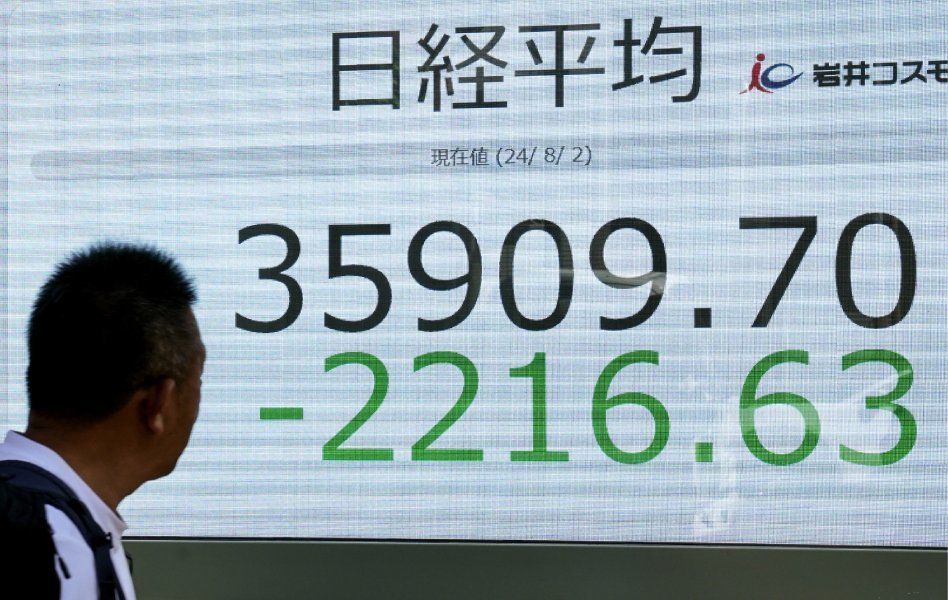
A potential sharp slowdown in the US economy is raising expectations that the Federal Reserve will cut interest rates. This comes just as Asian countries such as Japan are pursuing policies to raise interest rates to contain inflation and is boosting the value of the yen against the US dollar, making export-dependent Japanese stocks less attractive.
Today Monday the Asian market in general, if we consider the index MSCI Asia Pacific ex-Japan (.MIAPJ0000PUS) fell more than 2%, while Japan’s Nikkei (.N225) plunged 12.4%.
This came as US stocks fell more than 2% (in Asian trading hours today), following sharp declines last Friday due to weak US jobs data, which raised fears that the labour market could deteriorate and make the US economy vulnerable to a possible recession.
The impact on Asian stock markets
Asian stock markets, led by Japan, South Korea and Taiwan, They collapsed today Mondayfollowing last week’s global declines.
The whole process was consolidated just a few hours ago when the Nikkei closed the session with a 12.40% drop, its second biggest drop in history (and its worst since 1987). Analysts indicate that this is due to the effect of pessimism surrounding the US economy and the strengthening of the yen, encouraged by the latest interest rate hike by the Bank of Japan (BoJ).
This trend has been consolidated over the past seven days, when the BoJ raised interest rates for the second time this year, and the yen accelerated its rally against the dollar and the euro. This comes after a weak Japanese currency had been favourable to the Nikkei during the first half of the year, but the momentum has now been reversed.
The Japanese government, for its part, sent a message after the stock market crash that sought to reassure the public. “The government is closely monitoring the fall of the stock market,” said Japanese Finance Minister Shunichi Suzuki, hours after the financial shock, which according to analysts was motivated by the sharp strengthening of the yen, which today moved between 141.68 and 146.63 units per dollar.
Today the Asian market in general, if we consider the index MSCI Asia Pacific ex-Japan (.MIAPJ0000PUS) fell more than 2%, while Japan’s Nikkei (.N225) plunged 12.4%.
“It is desirable that the yen moves in a stable manner based on fundamentals and we will closely monitor the currency market, taking appropriate decisions calmly,” added the Japanese financial official.
It is worth noting that this significant appreciation of the Japanese yen follows the BoJ’s decision last week to carry out its second increase in reference interest rates so far this year, to 0.25%.
At the same time, fears of a US recession have raised expectations that the US Federal Reserve (Fed) will speed up the pace of its planned rate cuts, which would narrow the gap in the monetary policies of the two powers, a gap that has been, in fact, the main factor in the appreciation of the yen against the dollar in recent years.
Chinese yuan and Japanese yen hit seven-month highs on US rate cuts expected
What happened in South Korea?
The Seoul Stock Exchange fell 8.77% at the close of trading today.
The South Korean market, like the rest of the Asian markets, has also been affected by the falls with which Wall Street closed last week, following a worrying report on the situation of the US labour market.
The South Korean won weakened more than 1 percent on Friday from a two-month high as foreign investors dumped 1.5 trillion won ($1.09 billion) worth of South Korean stocks in their biggest sale in two and a half years.
The case of Taiwan
Taiwan was one of several markets that plunged amid fears the United States could be heading for a recession, as investors sought refuge in risky assets.
In this context, Taiwanese stocks (.TWII) fell a record 8.4%, including technology stocks such as TSMC (2330.TW).
There was alarm on the small island today: it was the worst one-day drop for the main index in percentage terms. The market lost 1,807.21 points to close at 19,830.88, the biggest drop in a single session in its history.
The whole process was consolidated just a few hours ago when the Nikkei fell 12.40% at the close of the session, its second biggest fall in history (and its worst collapse since 1987).
As Reuters reports, shares of Taiwan Semiconductor Manufacturing (TSMC) (2330.TW), the world’s largest contract chipmaker, were greatly affectedIts shares had been rising over the past year amid soaring demand for chips used in artificial intelligence, but their price plunged 9.75%, close to the daily limit of 10%, to close at NT$815.
Taiwan’s other three top-weighted tech stocks also posted sharp declines: Mediatek (2454.TW) lost 9%, while Quanta (2382.TW) and Foxconn (2317.TW) fell around 10%.
Nikkei plunges to historic low amid US recession fears
The effects in China
The Hong Kong, Shanghai and Shenzhen stock exchanges, to a lesser extent, were already in the red by midday on Monday (Asian time), with falls of less than 3% overall, which became more acute throughout the day.
But the yuan has been appreciating against the dollar, currently reaching its highest level in the last seven months, following the trend of the Japanese yen. This cushioned the impact of the international financial crisis internally, because the strengthening of the national currency would allow the central bank of that country greater room to carry out monetary easing strategies.
Pacific Asia
The falls have also spread to the stock markets of Southeast Asia, where the Singapore stock exchange led the day in declines, standing at around -4%; followed by the Philippines (almost -3%); and Malaysia (-2.75%), around three hours before closing.
In Australia, the ASX 200 index fell 3.7% at the close, bringing the benchmark to its lowest point in two months.

Co-founder of ReporteAsia.
Source: https://reporteasia.com/economia/2024/08/05/bolsas-asia-desplomaron-fuertes-bajas-mercados-financieros-globales/

